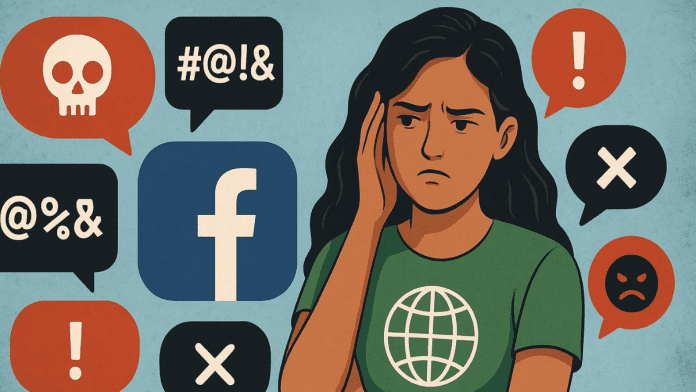🕒 Last updated on August 16, 2025
A new global survey has revealed a troubling reality for those who protect the planet. Environmentalists and land defenders are increasingly facing harassment and intimidation on social media platforms.
Growing risks for environmental defenders
The survey, carried out across six continents, found that online abuse has become a near-universal experience for those speaking out about climate and environmental issues.
According to the findings, more than nine out of ten environmental defenders reported experiencing some form of abuse or harassment online. Many of them described how these attacks created fear for their safety, disrupted their work, and even spilled into offline threats. Over 60 percent admitted they have feared for their lives or safety because of this harassment. Nearly half reported a decline in their ability to focus on their work due to constant online intimidation.
Social media, which was once seen as a tool to amplify voices for justice and climate action, has now become a dangerous space for many activists. The survey showed that a large majority of those who face harassment online believe it directly or indirectly contributed to threats they later encountered in their offline lives.
Social media platforms named among the worst offenders
The survey highlighted that platforms owned by Meta—Facebook, WhatsApp, and Instagram—were most frequently mentioned as places where abuse takes place. Facebook, being the largest platform in the world with billions of users, emerged as the single most cited space for harassment of environmental defenders. WhatsApp and Instagram followed closely, alongside X (formerly Twitter), which was the second most commonly mentioned platform overall.
Alarmingly, over 80 percent of defenders who reported online harassment said they experienced it on one or more of these popular platforms. This makes sense given the size and reach of these networks. But what makes the situation more concerning is the lack of effective response from the companies themselves.
Mortgage rate decline to 6.67% drives surge in refinancing activity
Just 12% of defenders were happy with the reaction they got after reporting abuse to the platforms. The overwhelming majority said that their complaints were either ignored, dismissed, or not resolved properly. In fact, over 90 percent of defenders said social media platforms should be doing far more to protect them and their communities.
The abuse reported included violent threats, gender-based attacks, smear campaigns, and attempts to discredit or shame activists. In many cases, attackers used personal information or images, spreading lies and harmful rumors designed to break trust and credibility. For some, the abuse even led to criminalization or arrests linked to their activism.
How online abuse spills into offline harm
The study also exposed a clear link between online harassment and real-world dangers. Many defenders reported that online threats were followed by offline intimidation, such as physical attacks, surveillance, or direct threats to family and community members. Some were even subjected to attempts at silencing through false accusations or criminal charges.
The platforms themselves appear to play a role in worsening the problem. Defenders pointed to features such as algorithms that fuel polarization, weak content moderation systems, and the ability of trolls and fake accounts to spread harmful content unchecked. The propagation of harassment was also identified as being facilitated by monetization methods that favor extreme or contentious content.
Almost two-thirds of those surveyed believed that these platform designs made the abuse they experienced worse. The scale of the harassment has created a chilling effect, where many activists are discouraged from speaking out. Online spaces that should empower defenders to share their message are instead pushing them into silence through fear and intimidation.
The findings come at a time when the world continues to witness alarming violence against environmental defenders. In 2023, nearly 200 activists were killed globally for protecting their land, communities, or natural resources. The new research makes clear that online abuse is not just an isolated issue but part of a wider pattern of threats against those working to safeguard the planet.

